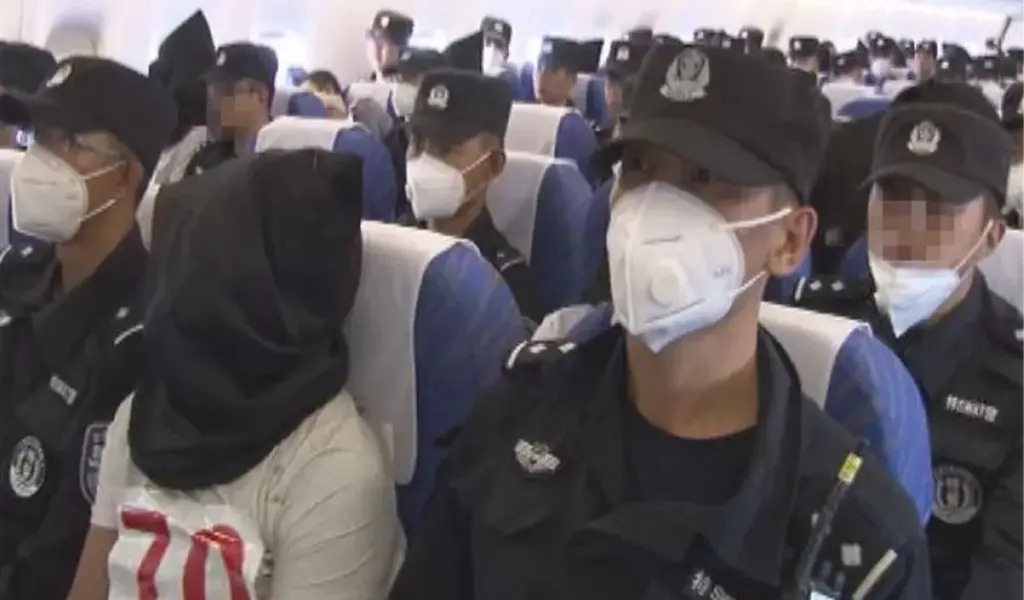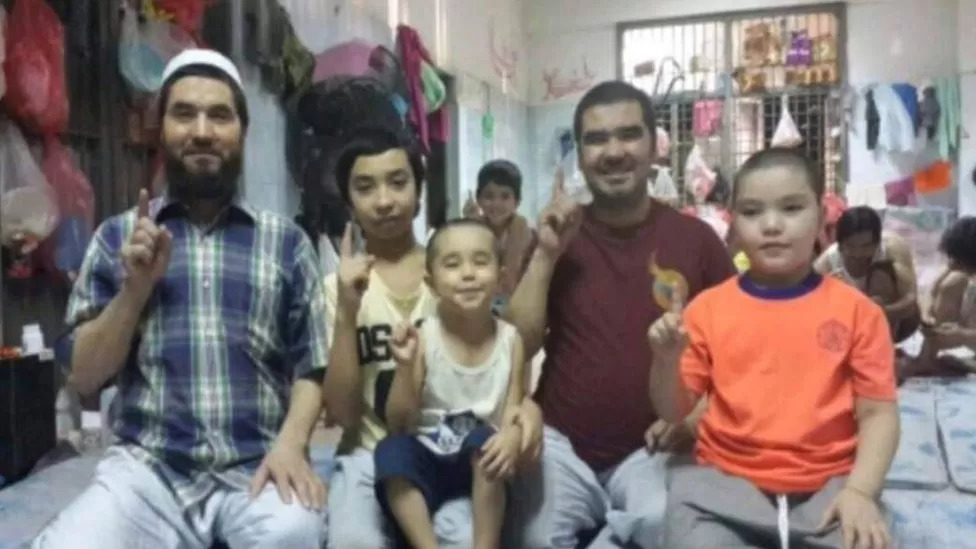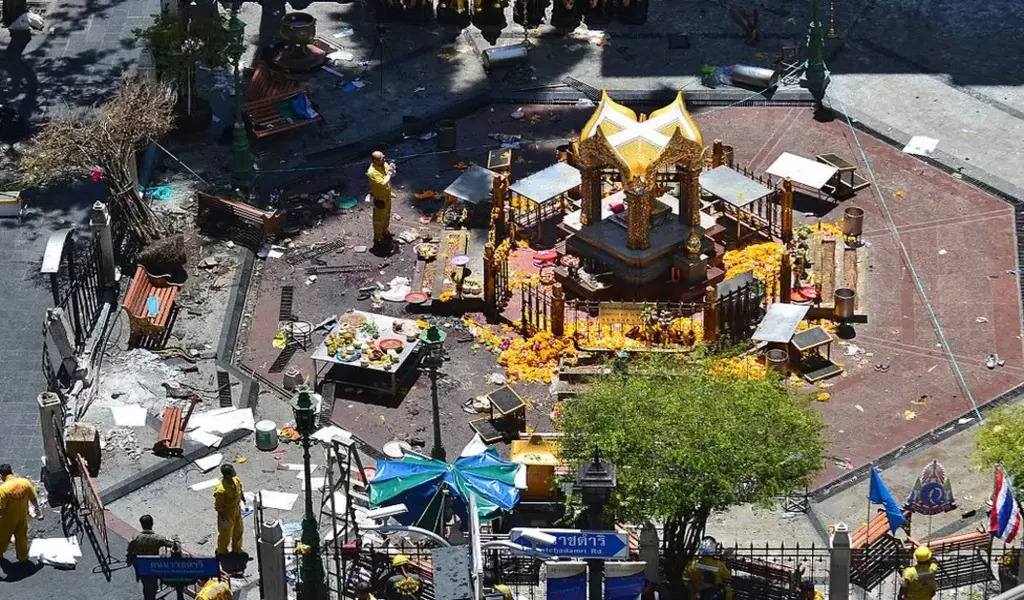News
Thailand Under Pressure After Death Of Uyghur Asylum-Seeker ‘Aziz Abdullah’

(CTN NEWS) – BANGKOK – The death of a 49-year-old Uyghur asylum seeker Aziz Abdullah in Thailand has spurred rights organizations to call for the release of 50 Uyghur men detained for nine years.
Aziz Abdullah passed away in Bangkok’s Immigration Detention Center after collapsing there.
He was one of around 350 Uyghur asylum seekers who left western China’s Xinjiang region in 2013 and were imprisoned in Thailand.
Human rights organizations estimate that over a million individuals have recently been detained in a large network of detention facilities in Xinjiang, where China has been accused of committing crimes against humanity against Uyghur Muslims and other minorities.
China, which refers to them as “re-education camps,” refutes abuse claims.

Thailand decided to repatriate 109 Uyghurs to China in 2015, despite pleas from the UN/ CCTV
Aziz Abdullah Traveled To Thailand In 2013
Aziz Abdullah, a farmer from a remote area of southwestern Xinjiang, traveled to Thailand in the latter part of 2013 with his wife, who was expecting his brother and seven kids.
He had been extremely unwell for more than three weeks, according to activists in contact with detainees at the Immigration Detention Center, but the Thai authorities refused to bring him to the hospital until he passed off.
Polat Sayim, the World Uyghur Congress‘s director in Australia, said, “He was coughing and vomiting blood – he could not eat.”
A doctor evaluated him at the IDC and declared that his condition was normal and that no real illness was present.
After ultimately collapsing, he was transported to the hospital but was quickly declared dead. Lung infection is listed as the cause of death on the hospital’s death certificate.
Activists claim that when his party was stopped in southern Thailand, they attempted to travel to Malaysia and Turkey.
Most Uyghurs at the time pretended to be Turkish to avoid being sent back to China, and Turkey was granting some of them citizenship. Early in July 2015, the Thai government authorized the flight to Turkey for 173 of them, including the wife and kids of Aziz Abdullah.

Aziz Abdullah (right) and family before they fled to Thailand/ COURTESY ABDULLAH FAMILY
Chinese Tourists Attack Bangkok
China, however, reacted vehemently to this and charged Turkey with “conniving in illegal immigration activities” and intervening in a bilateral matter.
The Thai government also permitted Chinese embassy representatives to visit and evaluate asylum seekers.
However, on July 8, 2015, against the UNHCR‘s and other governments’ requests, Thailand forcibly repatriated at least 109 Uyghur men, placing them on a plane and sending them back to China while handcuffed and hooded.
They included the brother of Aziz Abdullah.
Chinese state media labeled them as members of gangs that smuggle people, with some of them being charged with terrorist activity. After the men arrived in China, little is known about what happened to them.
The Thai government defended its choice by claiming that although the Chinese had requested that all Uyghurs be brought home, only a small number had been sent.
A potent bomb detonated six weeks later at a shrine in the heart of Bangkok that was well-liked by Chinese tourists, killing 20 people and injuring many more.

The attack on the Erawan shrine killed 20 people/ GETTY IMAGES
The Thai authorities stated that it resulted from competition between people-smuggling organizations, but further evidence pointed to Uyghur terrorist groups as the most likely culprits.
While one of the two Uyghur men, who says he is innocent, was detained and charged with the explosion, it’s possible that he was simply another asylum seeker apprehended by Thai police during a raid on a home they believed to have been used by the bomb-makers.
Their trial has been delayed for eight years after their arrest; the Thai government appears unmotivated to complete it, and the two men are still being held without charge.
The remaining 50 or so Uyghur detainees were formerly housed in detention facilities spread throughout Thailand, but after three of them tried to flee, they were all transferred to Bangkok’s notoriously jam-packed Immigration Detention Center.
Aziz Abdullah, an Uyghur asylum-seeker died after he collapsed in the Immigration Detention Centre in Thailand, where he was held for 9 years. Rights group says the conditions in the IDC are “even worse than regular Thai prisons”. Story by @pakhead https://t.co/Y5D1Cc1cgj
— Ryn J. (@Ryn_writes) February 21, 2023
The Uyghurs are kept apart from one another and have little interaction with the outside world, according to campaigners working to help them.
According to Chalida Tacharoensuk of the People’s Empowerment Foundation, which has pushed for improved treatment of the Uyghurs, “it is far worse than conventional Thai prisons.”
It’s quite crowded. Food is scarce, and the food that is offered is unhealthy. For Muslim prisoners, there is no halal food available. They must drink tap water, which isn’t particularly clean.
Very little healthcare is available. They only receive painkillers or other comparable medications if they become ill.
“This tragedy is a completely expected effect of a Thai policy choice to lock away these Uyghurs and, essentially, toss away the key,” said Phil Robertson of Human Rights Watch.

“The health effects of indefinite imprisonment in crowded, filthy immigration cells with inadequate healthcare and nourishment were not considered.”
The Bangkok IDC’s spokesman was reachable by phone, but the BBC was unsuccessful. Police in Thailand declined to respond through a spokesperson.
According to the UNHCR, no contact with the inmates has been permitted. The Thai National Human Rights Commission has requested authorization to visit the Uyghurs in the IDC for several months.
A date was finally assigned this month, and it will be submitted this week.
The Bangkok IDC’s conditions have not improved much despite the Thai government’s pledge to collaborate with the UN to better the screening and care of the tens of thousands of refugees and asylum seekers nationwide.
If Thailand were ready to release the Uyghurs, activists believe they would likely receive resettlement in a third nation. But a reliable Thai source claims that the administration is too worried about upsetting China.
Aziz Abdullah was buried in a cemetery at a mosque adjacent to the Chao Phraya River in the heart of Bangkok when his body was eventually released to members of the Thai Muslim community.
RELATED CTN NEWS:

News
Google’s Search Dominance Is Unwinding, But Still Accounting 48% Search Revenue

Google is so closely associated with its key product that its name is a verb that signifies “search.” However, Google’s dominance in that sector is dwindling.
According to eMarketer, Google will lose control of the US search industry for the first time in decades next year.
Google will remain the dominant search player, accounting for 48% of American search advertising revenue. And, remarkably, Google is still increasing its sales in the field, despite being the dominating player in search since the early days of the George W. Bush administration. However, Amazon is growing at a quicker rate.
Google’s Search Dominance Is Unwinding
Amazon will hold over a quarter of US search ad dollars next year, rising to 27% by 2026, while Google will fall even more, according to eMarketer.
The Wall Street Journal was first to report on the forecast.
Lest you think you’ll have to switch to Bing or Yahoo, this isn’t the end of Google or anything really near.
Google is the fourth-most valued public firm in the world. Its market worth is $2.1 trillion, trailing just Apple, Microsoft, and the AI chip darling Nvidia. It also maintains its dominance in other industries, such as display advertisements, where it dominates alongside Facebook’s parent firm Meta, and video ads on YouTube.
To put those “other” firms in context, each is worth more than Delta Air Lines’ total market value. So, yeah, Google is not going anywhere.
Nonetheless, Google faces numerous dangers to its operations, particularly from antitrust regulators.
On Monday, a federal judge in San Francisco ruled that Google must open up its Google Play Store to competitors, dealing a significant blow to the firm in its long-running battle with Fortnite creator Epic Games. Google announced that it would appeal the verdict.
In August, a federal judge ruled that Google has an illegal monopoly on search. That verdict could lead to the dissolution of the company’s search operation. Another antitrust lawsuit filed last month accuses Google of abusing its dominance in the online advertising business.
Meanwhile, European regulators have compelled Google to follow tough new standards, which have resulted in multiple $1 billion-plus fines.

Pixa Bay
Google’s Search Dominance Is Unwinding
On top of that, the marketplace is becoming more difficult on its own.
TikTok, the fastest-growing social network, is expanding into the search market. And Amazon has accomplished something few other digital titans have done to date: it has established a habit.
When you want to buy anything, you usually go to Amazon, not Google. Amazon then buys adverts to push companies’ products to the top of your search results, increasing sales and earning Amazon a greater portion of the revenue. According to eMarketer, it is expected to generate $27.8 billion in search revenue in the United States next year, trailing only Google’s $62.9 billion total.
And then there’s AI, the technology that (supposedly) will change everything.
Why search in stilted language for “kendall jenner why bad bunny breakup” or “police moving violation driver rights no stop sign” when you can just ask OpenAI’s ChatGPT, “What’s going on with Kendall Jenner and Bad Bunny?” in “I need help fighting a moving violation involving a stop sign that wasn’t visible.” Google is working on exactly this technology with its Gemini product, but its success is far from guaranteed, especially with Apple collaborating with OpenAI and other businesses rapidly joining the market.
A Google spokeswoman referred to a blog post from last week in which the company unveiled ads in its AI overviews (the AI-generated text that appears at the top of search results). It’s Google’s way of expressing its ability to profit on a changing marketplace while retaining its business, even as its consumers steadily transition to ask-and-answer AI and away from search.

Google has long used a single catchphrase to defend itself against opponents who claim it is a monopoly abusing its power: competition is only a click away. Until recently, that seemed comically obtuse. Really? We are going to switch to Bing? Or Duck Duck Go? Give me a break.
But today, it feels more like reality.
Google is in no danger of disappearing. However, every highly dominating company faces some type of reckoning over time. GE, a Dow mainstay for more than a century, was broken up last year and is now a shell of its previous dominance. Sears declared bankruptcy in 2022 and is virtually out of business. US Steel, long the foundation of American manufacturing, is attempting to sell itself to a Japanese corporation.
SOURCE | CNN
News
2024 | Supreme Court Won’t Hear Appeal From Elon Musk’s X Platform Over Warrant In Trump Case

Washington — Trump Media, The Supreme Court announced Monday that it will not hear an appeal from social media platform X about a search warrant acquired by prosecutors in the election meddling case against former President Donald Trump.
The justices did not explain their rationale, and there were no recorded dissents.
The firm, which was known as Twitter before being purchased by billionaire Elon Musk, claims a nondisclosure order that prevented it from informing Trump about the warrant obtained by special counsel Jack Smith’s team violated its First Amendment rights.
The business also claims Trump should have had an opportunity to exercise executive privilege. If not reined in, the government may employ similar tactics to intercept additional privileged communications, their lawyers contended.
Supreme Court Won’t Hear Appeal From Elon Musk’s X Platform Over Warrant In Trump Case
Two neutral electronic privacy groups also joined in, urging the high court to hear the case on First Amendment grounds.
Prosecutors, however, claim that the corporation never shown that Trump utilized the account for official purposes, therefore executive privilege is not a problem. A lower court also determined that informing Trump could have compromised the current probe.

Trump utilized his Twitter account in the weeks preceding up to his supporters’ attack on the Capitol on January 6, 2021, to spread false assertions about the election, which prosecutors claim were intended to create doubt in the democratic process.
The indictment describes how Trump used his Twitter account to encourage his followers to travel to Washington on Jan. 6, pressuring Vice President Mike Pence to reject the certification, and falsely claiming that the Capitol crowd, which battered police officers and destroyed glass, was peaceful.
Supreme Court Won’t Hear Appeal From Elon Musk’s X Platform Over Warrant In Trump Case
That case is now moving forward following the Supreme Court’s verdict in July, which granted Trump full immunity from criminal prosecution as a former president.
The warrant arrived at Twitter amid quick changes implemented by Musk, who bought the company in 2022 and has since cut off most of its workforce, including those dedicated to combating disinformation and hate speech.
SOURCE | AP
News
The Supreme Court Turns Down Biden’s Government Appeal in a Texas Emergency Abortion Matter.

(VOR News) – A ruling that prohibits emergency abortions that contravene the Supreme Court law in the state of Texas, which has one of the most stringent abortion restrictions in the country, has been upheld by the Supreme Court of the United States. The United States Supreme Court upheld this decision.
The justices did not provide any specifics regarding the underlying reasons for their decision to uphold an order from a lower court that declared hospitals cannot be legally obligated to administer abortions if doing so would violate the law in the state of Texas.
Institutions are not required to perform abortions, as stipulated in the decree. The common populace did not investigate any opposing viewpoints. The decision was made just weeks before a presidential election that brought abortion to the forefront of the political agenda.
This decision follows the 2022 Supreme Court ruling that ended abortion nationwide.
In response to a request from the administration of Vice President Joe Biden to overturn the lower court’s decision, the justices expressed their disapproval.
The government contends that hospitals are obligated to perform abortions in compliance with federal legislation when the health or life of an expectant patient is in an exceedingly precarious condition.
This is the case in regions where the procedure is prohibited. The difficulty hospitals in Texas and other states are experiencing in determining whether or not routine care could be in violation of stringent state laws that prohibit abortion has resulted in an increase in the number of complaints concerning pregnant women who are experiencing medical distress being turned away from emergency rooms.
The administration cited the Supreme Court’s ruling in a case that bore a striking resemblance to the one that was presented to it in Idaho at the beginning of the year. The justices took a limited decision in that case to allow the continuation of emergency abortions without interruption while a lawsuit was still being heard.
In contrast, Texas has been a vocal proponent of the injunction’s continued enforcement. Texas has argued that its circumstances are distinct from those of Idaho, as the state does have an exemption for situations that pose a significant hazard to the health of an expectant patient.
According to the state, the discrepancy is the result of this exemption. The state of Idaho had a provision that safeguarded a woman’s life when the issue was first broached; however, it did not include protection for her health.
Certified medical practitioners are not obligated to wait until a woman’s life is in imminent peril before they are legally permitted to perform an abortion, as determined by the state supreme court.
The state of Texas highlighted this to the Supreme Court.
Nevertheless, medical professionals have criticized the Texas statute as being perilously ambiguous, and a medical board has declined to provide a list of all the disorders that are eligible for an exception. Furthermore, the statute has been criticized for its hazardous ambiguity.
For an extended period, termination of pregnancies has been a standard procedure in medical treatment for individuals who have been experiencing significant issues. It is implemented in this manner to prevent catastrophic outcomes, such as sepsis, organ failure, and other severe scenarios.
Nevertheless, medical professionals and hospitals in Texas and other states with strict abortion laws have noted that it is uncertain whether or not these terminations could be in violation of abortion prohibitions that include the possibility of a prison sentence. This is the case in regions where abortion prohibitions are exceedingly restrictive.
Following the Supreme Court’s decision to overturn Roe v. Wade, which resulted in restrictions on the rights of women to have abortions in several Republican-ruled states, the Texas case was revisited in 2022.
As per the orders that were disclosed by the administration of Vice President Joe Biden, hospitals are still required to provide abortions in cases that are classified as dire emergency.
As stipulated in a piece of health care legislation, the majority of hospitals are obligated to provide medical assistance to patients who are experiencing medical distress. This is in accordance with the law.
The state of Texas maintained that hospitals should not be obligated to provide abortions throughout the litigation, as doing so would violate the state’s constitutional prohibition on abortions. In its January judgment, the 5th United States Circuit Court of Appeals concurred with the state and acknowledged that the administration had exceeded its authority.
SOURCE: AP
SEE ALSO:
Could Last-Minute Surprises Derail Kamala Harris’ Campaign? “Nostradamus” Explains the US Poll.
-

 News4 years ago
News4 years agoLet’s Know About Ultra High Net Worth Individual
-
Entertainment3 years ago
Mabelle Prior: The Voice of Hope, Resilience, and Diversity Inspiring Generations
-
News11 years ago
Enviromental Groups Tell Mekong Leaders Lao Dam Evaluation Process Flawed
-

 Health4 years ago
Health4 years agoHow Much Ivermectin Should You Take?
-

 Tech3 years ago
Tech3 years agoTop Forex Brokers of 2023: Reviews and Analysis for Successful Trading
-

 Lifestyles3 years ago
Lifestyles3 years agoAries Soulmate Signs
-

 Entertainment3 years ago
Entertainment3 years agoWhat Should I Do If Disney Plus Keeps Logging Me Out of TV?
-

 Health4 years ago
Health4 years agoCan I Buy Ivermectin Without A Prescription in the USA?


